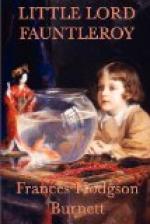And on his return to the Castle, Fauntleroy had repeated her words to his grandfather.
“And I thought about you when she said that,” he ended; “and I told her that was the way the world was because you had lived, and I was going to try if I could be like you.”
“And what did she say to that?” asked his lordship, a trifle uneasily.
“She said that was right, and we must always look for good in people and try to be like it.”
Perhaps it was this the old man remembered as he glanced through the divided folds of the red curtain of his pew. Many times he looked over the people’s heads to where his son’s wife sat alone, and he saw the fair face the unforgiven dead had loved, and the eyes which were so like those of the child at his side; but what his thoughts were, and whether they were hard and bitter, or softened a little, it would have been hard to discover.
As they came out of church, many of those who had attended the service stood waiting to see them pass. As they neared the gate, a man who stood with his hat in his hand made a step forward and then hesitated. He was a middle-aged farmer, with a careworn face.
“Well, Higgins,” said the Earl.
Fauntleroy turned quickly to look at him.
“Oh!” he exclaimed, “is it Mr. Higgins?”
“Yes,” answered the Earl dryly; “and I suppose he came to take a look at his new landlord.”
“Yes, my lord,” said the man, his sunburned face reddening. “Mr. Newick told me his young lordship was kind enough to speak for me, and I thought I’d like to say a word of thanks, if I might be allowed.”
Perhaps he felt some wonder when he saw what a little fellow it was who had innocently done so much for him, and who stood there looking up just as one of his own less fortunate children might have done—apparently not realizing his own importance in the least.
“I’ve a great deal to thank your lordship for,” he said; “a great deal. I——”
“Oh,” said Fauntleroy; “I only wrote the letter. It was my grandfather who did it. But you know how he is about always being good to everybody. Is Mrs. Higgins well now?”
Higgins looked a trifle taken aback. He also was somewhat startled at hearing his noble landlord presented in the character of a benevolent being, full of engaging qualities.
“I—well, yes, your lordship,” he stammered, “the missus is better since the trouble was took off her mind. It was worrying broke her down.”
“I’m glad of that,” said Fauntleroy. “My grandfather was very sorry about your children having the scarlet fever, and so was I. He has had children himself. I’m his son’s little boy, you know.”
Higgins was on the verge of being panic-stricken. He felt it would be the safer and more discreet plan not to look at the Earl, as it had been well known that his fatherly affection for his sons had been such that he had seen them about twice a year, and that when they had been ill, he had promptly departed for London, because he would not be bored with doctors and nurses. It was a little trying, therefore, to his lordship’s nerves to be told, while he looked on, his eyes gleaming from under his shaggy eyebrows, that he felt an interest in scarlet fever.




